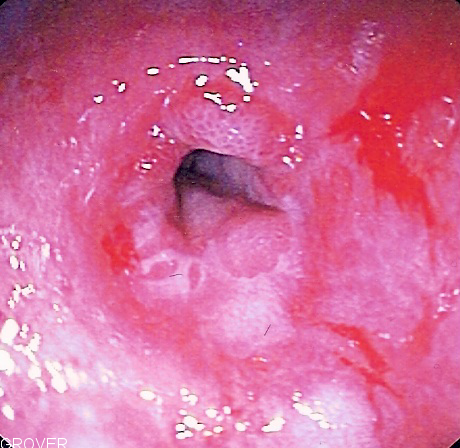
Disease caused by stomach acid coming up from the stomach into the esophagus.
Sinónimos
Examples for "ger"
Examples for "ger"
1
But one day a stran-ger from the South came into the palace.
2
Freed from in-ju-ry or risk, al-so se-cure from dan-ger or loss.
3
Chakahai came out of her ger to see what the sudden shouts meant.
4
When Genghis entered the ger, the men within sat subtly straighter.
5
So when I gave ger a piece of pav, her reaction was brilliant.
1
However, no direct causal link was found between delayed emptying and reflux.
2
The authors developed a series of operative procedures to prevent venous reflux.
3
Two animals with gastro-duodeno-esophageal reflux had esophageal double and triple carcinomas respectively.
4
This may reflect a philosophical change in reflux management by injection therapy.
5
There is flux and reflux throughout, passion peeping out in the coda.
1
Cholecystectomy followed by conservative treatment of GERD was performed in 55 patients.
2
The present results suggest that a relationship exists between GERD and constipation.
3
Holloway. It was the trooper in the car Gerd had been piloting.
4
Family history was found to be a significant predictor of GERD symptoms.
5
Gerd himself was accommodated in the spare room of the living hut.
1
Background: It has been suggested that disturbed activity of the autonomic nervous system is one of the factors involved in gastroesophageal reflux (GER) in adults.
1
I've had terrible acid reflux ever since I was in my teens.
2
These events could represent either false-positive measurements or association with weakly acid reflux.
3
She'd had trouble with what would now be called acid reflux.
4
The way this night is unfolding, I'm going to have killer acid reflux.
5
Both are sold by prescription to treat acid reflux and ulcers.
1
AGI has ended a licensing agreement with fellow pharmaceutical firm Axcan in relation to a treatment for gastro-esophageal reflux disorder.
1
The implication of these studies in treating gastroesophageal reflux disease are discussed.
2
There was no important pathological gastroesophageal reflux before and after gastric bubble.
3
Treatment usually was begun empirically, without a preceding study to document gastroesophageal reflux.
4
Twenty-one percent of adenocarcinoma patients had other symptoms presentation, including gastroesophageal reflux disease.
5
Three had a history of gastroesophageal reflux, but only 1 had active symptoms.
1
The implication of these studies in treating gastroesophageal reflux disease are discussed.
2
Twenty-one percent of adenocarcinoma patients had other symptoms presentation, including gastroesophageal reflux disease.
3
Whether these individuals have a higher chance to develop gastroesophageal reflux disease is unknown.
4
The occurrence of gastric ulcers after laparoscopic fundoplication for gastroesophageal reflux disease is not uncommon.
5
The data suggest potential implications in the pathogenesis of related diseases such as gastroesophageal reflux disease.
6
Conclusion: We noticed 5 vocal fold bamboo nodes and gastroesophageal reflux disease in almost all patients.
7
A decrease of parasympathetic tone has been noted in gastroesophageal reflux disease of neonates and adults.
8
Lower esophageal sphincter augmentation through injection of muscle-derived cells is a novel potential treatment for gastroesophageal reflux disease.
9
Conclusions: The vast majority of surgeons advocated laparoscopic surgery for the treatment of gallbladder stones and gastroesophageal reflux disease.
10
There are many causes for it but asthma, chronic rhinosinusitis and gastroesophageal reflux disease account for most of the cases.
11
Conclusion: Approximately 14% of patients presenting for surgical treatment of gastroesophageal reflux disease or paraesophageal hernias demonstrate a shortened esophagus.
12
Results: Ninety-nine patients (25%) had a diagnosis of gastroesophageal reflux disease at the time of referral and had been treated with acid-suppressing medications.
13
Laparoscopic fundoplication and gastrostomy tube placement have grown in popularity within the pediatric population for treatment of gastroesophageal reflux disease and failure to thrive, respectively.
14
Vocal fold bamboo node was observed in 5 patients and 92.3% of all patients presented laryngeal signs of gastroesophageal reflux disease.
15
We analyzed clinical and laboratory findings in 357 patients who had an operation for gastroesophageal reflux disease between October 1992 and November 2002.
16
Background: Gastroesophageal reflux disease is one of the most common causes of chronic cough.
portugués
español
reflujo gastroesofágicoergereflujo gastro-esofágicoenfermedad del reflujo gastroesofagicoreflujo gastro esofagicoreflujo de acidorgereflujo gastro-esofagicoenfermedad del reflujo gastroesofágicoreflujo gastroesofagicoreflujo gastro esofágicoenfermedad por reflujo gastroesofágicoreflujo de ácidoenfermedad por reflujo gastroesofagico

